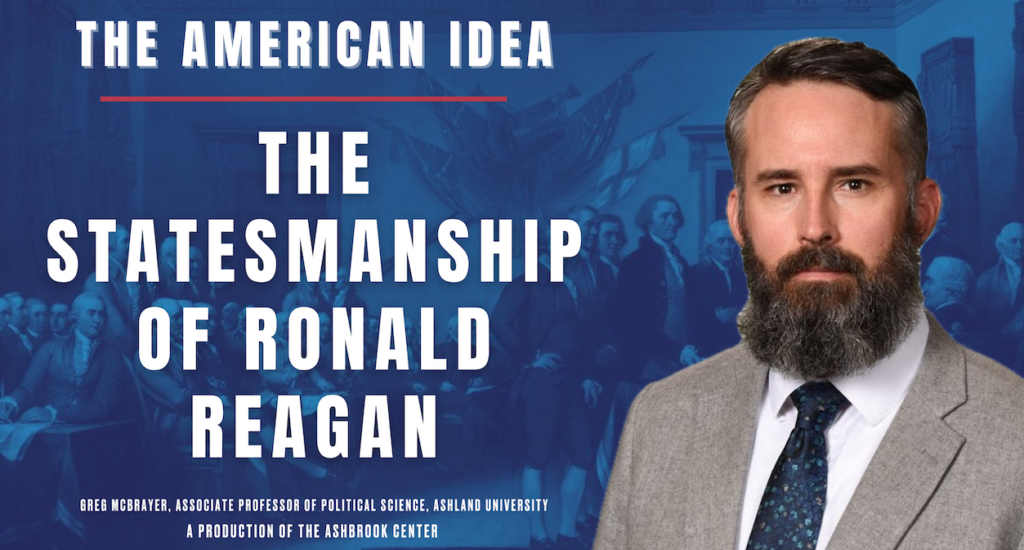The Statesmanship of Ronald Reagan
March 26, 2025

Listen and subscribe to the podcast
Join The American Idea’s Listener Email list – get news about upcoming episodes and a chance to offer questions for them, too!
Sign up for “Tear Down This Wall,” Ashbrook’s latest free online Masterclass.
A Visionary Emerges
Ronald Reagan’s rise to statesmanship began well before his presidency, rooted in a steadfast commitment to principles that would define his political career. His transformation from Hollywood actor to influential conservative leader was marked by his 1964 speech, “A Time for Choosing,” delivered in support of Barry Goldwater’s presidential campaign. Though Goldwater lost, Reagan emerged as a persuasive and charismatic advocate for limited government, individual freedom, and a return to America’s founding ideals. His ability to articulate complex political ideas in simple, compelling terms set the stage for his ascendancy in the Republican Party and, ultimately, the White House.
Reagan’s statesmanship was not built on mere rhetoric. It was forged in his tenure as governor of California, where he demonstrated a willingness to confront difficult issues head-on. He balanced budgets, confronted student protests, and managed the competing interests of an economically diverse state, all while refining the leadership style that would later define his presidency. His ability to navigate political turbulence with clarity and resolve distinguished him from many of his contemporaries, establishing his reputation as a leader with both vision and conviction.
Principles in Action
At the core of Reagan’s statesmanship was his unwavering belief in freedom—both at home and abroad. His domestic policies were centered on reducing government intervention, fostering economic growth, and restoring national confidence. The Reagan administration’s economic agenda, often referred to as “Reaganomics,” pursued tax cuts, deregulation, and a reduction in government spending to stimulate private sector growth. Critics debated the long-term effects of these policies, but their immediate impact revitalized an economy plagued by stagflation and high unemployment.
On the world stage, Reagan’s commitment to freedom shaped his foreign policy. He saw the Cold War not merely as a geopolitical struggle but as a moral contest between democracy and tyranny. His description of the Soviet Union as the “Evil Empire” was more than provocative rhetoric—it was a declaration of ideological opposition to a regime he viewed as fundamentally oppressive. Reagan’s willingness to challenge the prevailing policy of détente, which sought to ease tensions between the U.S. and the USSR through diplomatic compromise, set him apart. Instead, he pursued a strategy of military and economic pressure, betting that the Soviet system’s inherent weaknesses would lead to its collapse.
Courage and Strategy
Reagan’s leadership was defined by his ability to stand firm on his principles, even in the face of significant opposition. Early in his presidency, he demonstrated this resolve by firing over 11,000 striking air traffic controllers. This decision was controversial, but Reagan viewed it as necessary to uphold the rule of law and the integrity of labor agreements. It sent a clear message that he was not afraid to make difficult choices, a trait that would define his presidency.
Nowhere was Reagan’s courage more evident than in his approach to the Cold War. His administration embarked on a massive military buildup, including the Strategic Defense Initiative (SDI), a missile defense program that many critics dismissed as unrealistic. However, Reagan understood that forcing the Soviets to keep pace in an arms race would strain their already faltering economy. This strategic gamble paid off, as Soviet leader Mikhail Gorbachev eventually sought negotiations, leading to historic arms reduction agreements.
Yet Reagan was not simply a hardliner; he knew when to temper confrontation with diplomacy. His relationship with Gorbachev evolved from one of suspicion to one of cautious engagement. Reagan’s ability to recognize Gorbachev’s unique position within the Soviet hierarchy allowed for a shift from military escalation to diplomatic progress. The signing of the Intermediate-Range Nuclear Forces (INF) Treaty in 1987 was a testament to Reagan’s statesmanship—his ability to balance strength with pragmatism, ensuring that his ideological commitments did not preclude effective diplomacy.
A Lasting Legacy
Reagan’s statesmanship left an indelible mark on both American politics and international affairs. Domestically, he reinvigorated conservative ideals, shaping the Republican Party for decades to come. His policies and leadership style continue to influence debates on taxation, government regulation, and national identity. The economic boom of the 1980s, coupled with a renewed sense of patriotism, helped restore confidence in the American experiment.
Internationally, Reagan’s leadership contributed to the end of the Cold War. His relentless opposition to Soviet expansion, combined with his eventual willingness to engage with Gorbachev, created the conditions for the dissolution of the Soviet Union. His 1987 speech in Berlin, where he famously called on Gorbachev to “tear down this wall,” became a defining moment in the struggle for freedom in Eastern Europe. Within two years, the Berlin Wall fell, and shortly thereafter, the Soviet Union crumbled—validating Reagan’s belief that tyranny could not endure in the face of determined opposition.
Reagan’s farewell address encapsulated his view of America’s place in the world. He spoke of “informed patriotism,” urging future generations to understand and cherish the principles that had guided the nation’s history. He warned against complacency, reminding Americans that the preservation of freedom required vigilance and a deep appreciation of the values that defined the nation.
Ronald Reagan’s statesmanship was characterized by clarity of purpose, moral conviction, and an ability to adapt without sacrificing core principles. His leadership transformed the United States, reshaped global politics, and left a legacy that continues to inspire debates about governance, leadership, and the role of America on the world stage. Whether one agrees with all of his policies or not, his impact is undeniable—a testament to the power of principled leadership in shaping history.

